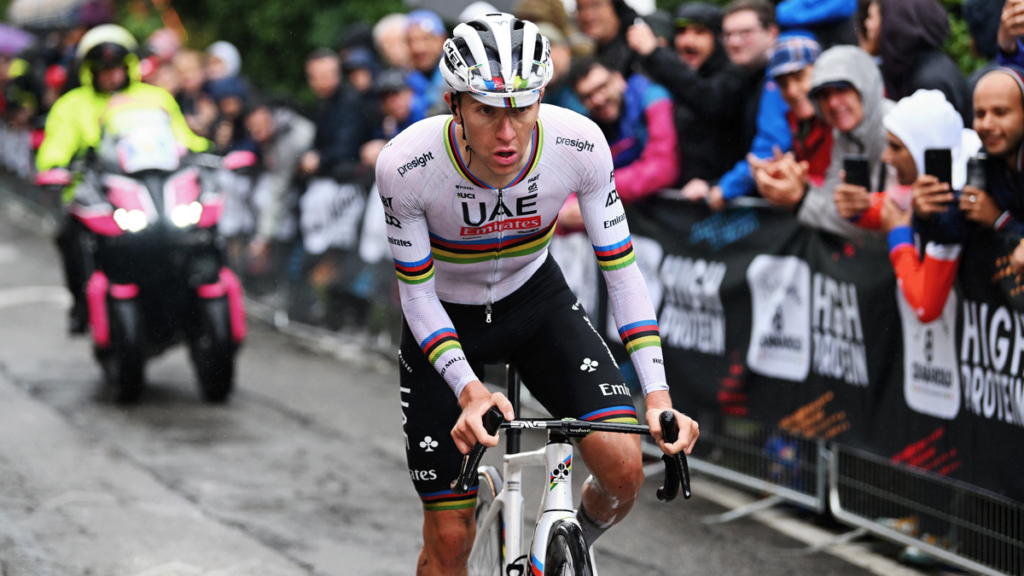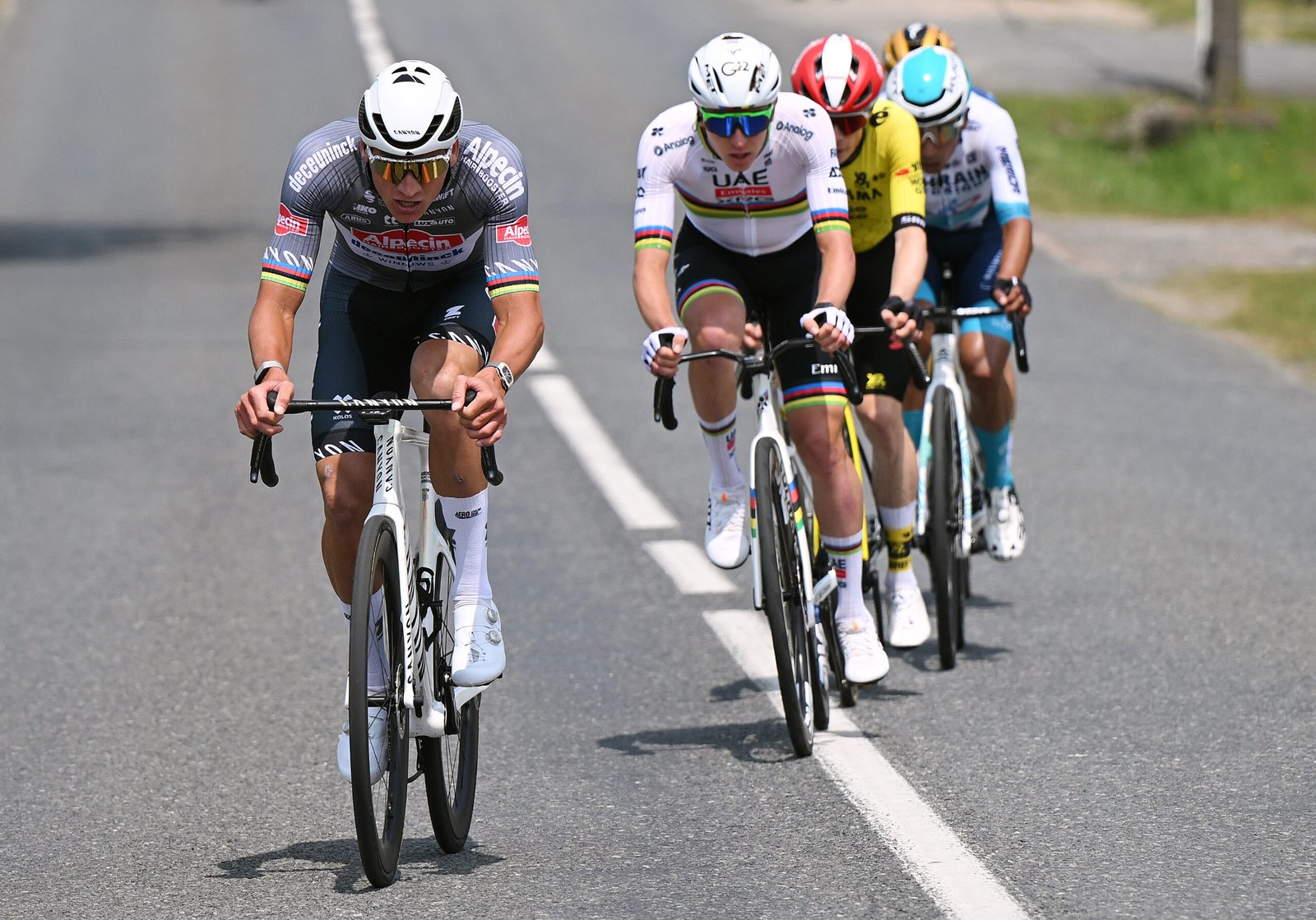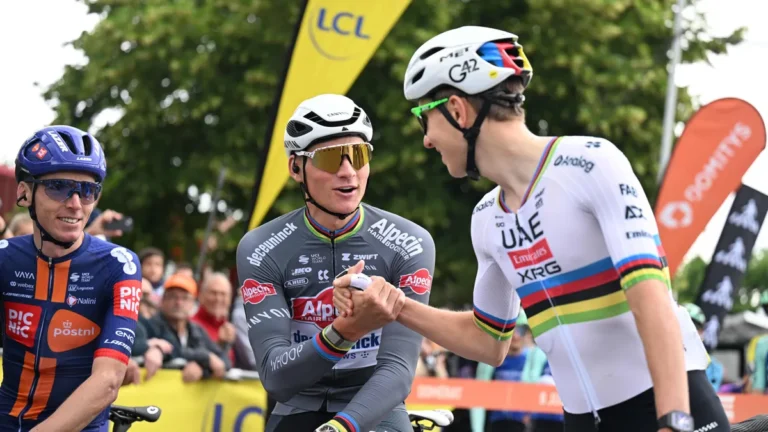
Mathieu van der Poel (Alpecin-Deceuninck) experienced conflicting emotions after just falling short of victory in an exciting first stage of the Critérium du Dauphiné. Despite his valiant effort in an intense battle with the general classification (GC) stars, Van der Poel finished in third place, just behind the duo of Tadej Pogačar (UAE Team Emirates-XRG) and Jonas Vingegaard (Visma-Lease a Bike). His performance, however, marked a significant sign of recovery, as it was his first major race since recovering from a wrist injury sustained in a recent mountain biking crash.
Although Van der Poel recognized that securing third place from a talented late surge indicated that his top form was returning, he still felt “disappointed” for not being able to match the pace of Pogačar and Vingegaard in the final push to the line in Montluçon. The Dutch rider admitted that his lack of preparation due to the injury had left him with insufficient leg strength to launch a successful sprint, an area where he is typically very strong.
Van der Poel’s performance throughout the stage demonstrated that he was almost back to his best, as he kept pace up the challenging final categorized ascent with 7 kilometers remaining. His ability to respond to Vingegaard’s sharp attack 5.5 kilometers from the finish, which also prompted Pogačar and Remco Evenepoel (Soudal-QuickStep) to escape, showed that he was capable of riding at the highest level, even if his final sprint didn’t match the power of some of his rivals.
It was evident that the wrist injury had set back his preparations for the Dauphiné. He had disclosed before the event that he hadn’t been able to train at full intensity following his injury, which left him without the explosive sprint that has become one of his trademarks. “I simply lacked the leg strength; as I mentioned before the race, I was unable to train in the weeks prior,” Van der Poel explained to reporters following the stage. His frustration was apparent as he acknowledged that his legs failed to regain enough strength for the final sprint, despite his solid performance earlier in the stage.

“If I hadn’t broken my wrist in a mountain bike race just two weeks earlier, Van der Poel would have been the clear favorite to triumph from the elite breakaway, which just managed to hold off the pursuing group. Instead, it was Pogačar who showed his superior sprinting power to claim the stage win, leaving Vingegaard in second place. The finish was a reminder of how difficult it can be to come back to peak form after an injury, especially when racing against riders like Pogačar and Vingegaard, who are in excellent condition heading into the summer’s grand tours.
Despite his slight disappointment at the result, Van der Poel was quick to recognize the positives from the stage. He knew that being able to keep pace with the climbers on the tough final climb was a clear indicator that his recovery was progressing well. He was the only non-pure climber to make it to the front group, a testament to his versatility and form. He expressed satisfaction with the overall performance, despite not being able to seal the win. “However, frankly, I’m pretty pleased with today’s performance,” he remarked. His efforts showed that he was capable of competing at a high level, and that his leg strength would improve with time and further races.
Van der Poel’s participation in the breakaway also demonstrated the type of racing he excels at. Despite his recent injury setbacks, he was still able to launch himself into the action and join the front group in a stage that was incredibly tough for non-climbers. “I wasn’t anticipating that we would join a group. I anticipated a steadier pace, but they aggressively surged from the bottom, making it a tough ascent,” he admitted. The aggressive pace set by Vingegaard and Pogačar forced Van der Poel to dig deep in the final kilometers, and it was clear that he had to push himself to his limit.
As the group approached the final 5 kilometers, Van der Poel found himself responding to sharp attacks from Vingegaard, and then from Pogačar and Evenepoel, as they made their moves. “Jonas then launched his attack from above, and I realized I had to pursue,” Van der Poel said. His response to these attacks demonstrated the competitive nature of his ride, even though the sprint to the finish line proved too much for him in the end. “Until the end, I was uncertain whether we would succeed,” he confessed, highlighting the tense nature of the race as it unfolded.
At the finish line, Van der Poel’s emotions were mixed. On one hand, he had been part of a highly competitive race and had shown that he was well on his way to regaining his best form. On the other hand, he felt a sense of disappointment that he couldn’t capitalize on the final sprint to win the stage. “I competed in a different weight category there, but I’m pleased I participated in this crucial action. Yet, naturally, somewhat let down that I wasn’t able to complete it,” he said. It was clear that although he had reason to be proud of his efforts, his natural instinct to win left him feeling unsatisfied with a third-place finish.
Looking ahead to the rest of the race, Van der Poel remains optimistic. The following stages of the Dauphiné feature more rolling landscapes, which may offer him additional opportunities to secure his first WorldTour stage victory since the 2022 Giro d’Italia. With his form continuing to improve after the injury, he will be hopeful that the intense effort of stage 1 will help further sharpen his legs for the coming challenges. Having shown that he still has the ability to compete with the best, he will likely have more chances to shine in the days to come.
As the Critérium du Dauphiné progresses, all eyes will be on Van der Poel to see if he can build on his impressive showing and claim the stage victory he is aiming for, while also proving that he is fully recovered from his wrist injury and back to his best.


